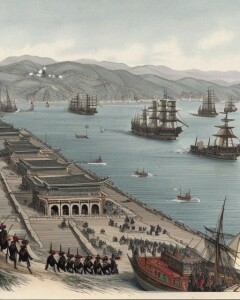Transport yourself back to the early 19th century and bear witness to a significant clash between two formidable forces – China and the British Empire. This momentous struggle, commonly known as the First Opium War, unfolded from 1839 to 1842 and left a lasting impact on their relationship.
At the heart of this conflict was the insidious opium trade, a destructive force that wreaked havoc on Chinese society. Through cunning and deceit, the British, acting through the powerful British East India Company, covertly smuggled opium from their Indian territories, flooding the Chinese market. The consequences were devastating. Addiction rapidly spread among the Chinese people, causing widespread devastation and pushing the nation into a deep economic crisis.
Motivated by a strong desire to put an end to this harmful trade, the Chinese imperial government launched a forceful crackdown, confiscating and destroying large quantities of opium. However, they did not anticipate that this act of defiance would ignite a full-blown conflict. Fiercely protecting their economic interests, the British swiftly retaliated with a resolute and decisive military response.
With superior firepower and unmatched naval capabilities, the British forces unleashed their might upon China. The battlefront witnessed a relentless series of significant victories as the British captured crucial coastal cities, including the highly desirable territories of Canton and Shanghai. Overwhelmed and outmatched, the Chinese succumbed to the relentless assault.
The climax of the war came with the signing of the Treaty of Nanking in 1842, a fateful agreement that burdened China immensely. According to its provisions, China was compelled to surrender Hong Kong to the British, open multiple ports for foreign trade, pay substantial indemnity, and grant extraterritorial rights to British citizens. This unequal treaty left China deeply humiliated, exposing its military weaknesses and setting the stage for a prolonged period of foreign dominance and subjugation by Western powers.
Simultaneously, the First Opium War solidified the British Empire’s control over East Asia, unlocking unprecedented opportunities for trade and expansion. It served as a remarkable stage to showcase their military strength and unrivaled naval superiority, leaving no doubt about the extent of their global influence.
The reverberations of this pivotal event extended far beyond its immediate consequences, leaving an enduring impact on the relationship between China and Western powers. For China, it acted as a powerful catalyst for change, awakening a strong desire for reform and modernization. The war ignited a profound sense of national humiliation among its people, propelling the nation towards grappling with the challenges posed by a rapidly evolving world.
In stark contrast, the British Empire reveled in its triumph, bolstering its supremacy within the region and unlocking new avenues for trade and expansion. The First Opium War became a platform to demonstrate their military might while leaving a lasting legacy of British military technology and naval dominance.
As the dust settled, it became increasingly clear that the First Opium War was more than a mere footnote in history. It fundamentally reshaped the course of events, forever altering the dynamics between China and Western powers. It stands as a monumental testament to the clash of empires fought over the intoxicating allure of power and control.

